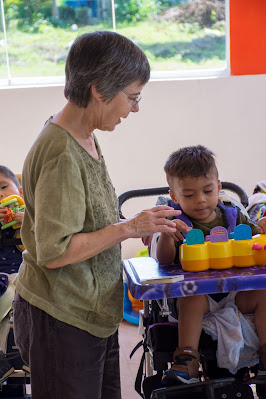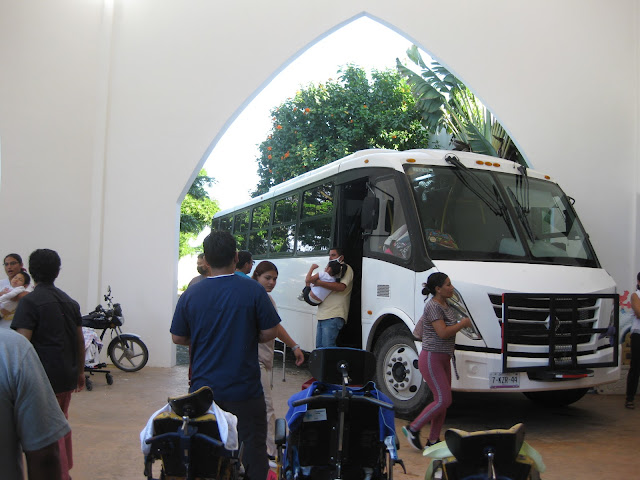Before the pandemic, I shipped books generously donated by Thames & Hudson, Hachette and Book Aid international to Pasitos de Luz, the charity that provides free of charge therapy, education and nutrition for disabled children in the Bahía de Banderas area of Mexico. Our son Chris works at Pasitos managing communications, events and fundraising. On 29 September 2022, Jan and I visited Pasitos with Chris for the first time since 2019. This was a parents' day, so Pasitos was particularly busy with 40 or so parents in addition to the children.
The pandemic was a turbulent time for Pasitos. The children could not attend, but their needs were even greater at home where their parents lacked the expertise, equipment and time to give them the therapy they needed. The staff of Pasitos responded with guidance for parents and food parcels. In a recent newsletter the chair of the board of Casa Connor wrote:
“First and foremost, the children have now been attending consistently for over 7 months! After some tumultuous times with Covid impacting attendance, we are gradually working to return to pre-Covid numbers. There are several things that are impacting the rate of return. One is that we are looking to increase our numbers of volunteers. We are also beginning to return to pre-Covid staffing numbers. By the end of 2022, we hope to have the capacity to accept all of our previous children that are available to return, and plan to expand with more new children ... After six years since our opening, we are delighted that the entire building is substantially completed. We will now focus on maximizing the utilization of the building, as we still have a waiting list of over 110 children. This can only be achieved with the continuous and wonderful support from each and every one of you, for which we are incredibly grateful.”
Shortly before we left for Mexico, I went to Book Aid International (https://bookaid.org/) in Camberwell to collect some books to take with us. This charity supplies English- and French-language books to Africa, the Middle East, South Asia, the Caribbean and to refugees in some Mediterranean countries. Its warehouse is a treasure trove of learning waiting to find readers whose lives can be transformed by books. The CEO of Book Aid, Alison Tweed, whom I know from our days working at Macmillan, Giorgia Cerruti and Owen Llewellyn have arranged to set aside Spanish-language books that they do not need. I collect the books and deliver them to Pasitos.
To reach Pasitos, you drive inland from the coast to San Vicente, where Chris lives. There you turn right onto a four-lane road that ends abruptly among cucumber and watermelon fields: the governor of Nayarit who commissioned the road left office before it was finished. A right turn on a camino de terracería (a dirt road) takes you on a bone-jolting journey through large puddles of rainwater to Casa Connor, otherwise known as El Castillo. The day begins with the arrival of the Pasitos bus. Children are helped off the bus to the dining room for breakfast. The children then spend the morning engaging in various activities. Some go to the therapy pool, newly built at the rear of the building, others to classrooms where teachers give them an education designed for their needs and abilities, others to the nursery and/or therapy sessions of various kinds.
 |
| El Castillo. |
On occasion, children might enjoy a relaxing session in the temascal, a sweatbath rather like a sauna that was common in prehispanic Mexico, or they can grow some plants in the organic garden. We were given a brief tour of the garden. There are fruit trees (papaya, bananas, star fruit), various vegetables and herbs, including chía, black basil, a plant with leaves that have an overwhelmingly sugary flavour and another (called pichipa) whose small leaves have a powerful aromatic and flavourful kick.
The current library is a small room with a modest collection in the nursery. Some of the books are not at all appropriate for the Pasitos children. For example, there is a shelf of English-language books. The only person able to read them is our son! Others are rather tired and much chewed and damaged. Nevertheless, Jan sat with some of the nursery children whose pleasure in turning the pages of a book was clear from their faces.
At the end of the day we gave a lift to a mother and her son. The son has a speech difficulty. His state school told his parents that it could not offer any kind of support. He now spends one or two days a week at Pasitos receiving speech therapy. His mother remarked that parents are often overwhelmed by the problems their children have, but Pasitos has enabled her and her husband to see their son's abilities, not just his speech problem. She was on her way to work at a large supermarket. Her usual shift is 13:00-21:00 with a one hour break.
Another story is an example of what can happen if a disabled child does not receive adequate therapy. The lady who cleans the apartment we rent in Bucerías told us that she has an adopted brother. Her mother found him as a very young boy with learning difficulties abandoned on the street and took him into her family – I am not sure whether he was formally adopted or not. The mother was very protective of her adopted son, but he grew up without any therapy to equip him for adult life and cannot read or write. He works in a car spare parts business stacking the shelves folowing careful instructions given to him for each job by the owner. He is 22 years old, the same age as Pasitos de Luz. If his mother had been able to send him to Pasitos his future might have been brighter,
My hope is that working with Alison, Giorgia, Llewellyn and other friends in the book industry we can help Pasitos to build a library that will introduce children who face a difficult future to the pleasures of reading. If anybody reading this can direct me to a source of Spanish-language children’s books please email me at: ianjacobsipswich@gmail.com.
Financing and improving the care that Pasitos offers free of charge is a constant challenge, as the list of needs on display in the lobby indicates:
To make a donation to Book Aid International go to: https://bookaid.org/donate/. To support Pasitos friends in Mexico,
the USA and Canada can donate at: https://pasitosdeluz.org/donate-1/
Friends in the UK please send me a cheque made out to Ian Jacobs or email me for my bank details. I will then pass your donation to Pasitos.
The following photos will give you an impression of the important work carried out at Pasitos.
The Pasitos bus arrives:
 |
| Brittany (the little girl with the bow in her hair), who has recently been taught to walk by Pasitos' therapists, has been helped off the bus and will now walk into breakfast. |
The dining room for breakfast (which consisted of augua fresca (fruit-flavorued water), scrambled eggs with beans, green beans and tomato, either in a taco or in a bowl, depending on the abilities of the child):
 |
| Aarón and Carlitos wait for breakfast. |
 | ||||
| Ian (sic) gets ready to drink his agua fresca. |
 |
| Children who can feed themselves have a taco for breakfast. |
 | |||
| Chris chats to Chepe, who I helped to eat his breakfast. He loves to high five and shake hands. But I needed help to persuade him to drink his agua fresca. |
 |
| Jan helps Aarón eat his breakfast. |
 |
| The books we delivered. |
 | ||
| The Pasitos library. |
Here I am in the nursery with Chepe, Cristian and Elién. Our game involved putting farmyard vehicles and animals in the house and watching them fall out when Elién or Cristian opened the front door.
 |
| We pause playing ball for Elién to pose for a photo. |
 |
| Jan helped Aarón with a toy that involved pressing or manipulating various shapes to open a lid below which was an animal. |
 |
| But Elién wanted to share his board book. |
 |
| The therapy pool. |
 |
| A papaya tree. |
 |
| Bananas growing in the garden. |
 |
| Our tour with Carlos the gardener ends. |









No comments:
Post a Comment